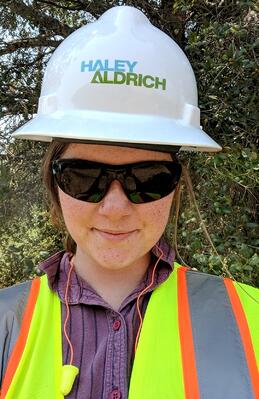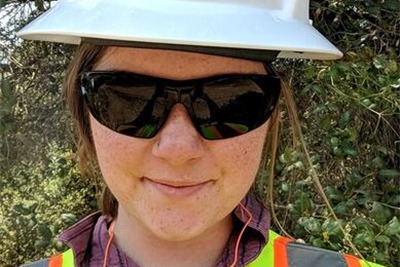An internship is more than a few lines on your resume – it’s an opportunity to gain invaluable real-world experience that you won’t find in a classroom and can ultimately help you land your dream job after graduation. In this Intern Spotlight, Anne Robertson, who just completed her second summer as an Intern in our Walnut Creek office, shares her experience and provides tips on how to get the most out of your internship, including getting up to speed while classifying soil in the field, making the most of your downtime, and more.

Name: Anne Robertson
School: University of California, Berkeley
Major(s)/Year of graduation: Received a Bachelor of Science in Civil Engineering in May 2019; Pursuing a Master of Science degree in Geotechnical Engineering, expected to graduate in May 2020
Haley & Aldrich office: Walnut Creek, California
What inspired you to get into geotechnical engineering/engineering in general?
I have always wanted to be an engineer of some sort – I’ve always really liked building things – but I became very intrigued with geotechnical engineering after taking a class on engineering geology in my freshman year at UC Berkeley. I love how the geologic history of an environment impacts how we have to treat it, and I am fascinated by the puzzle of understanding how soil acts!
What was your favorite experience as an intern at Haley & Aldrich?
I have had a number of great experiences as an intern – one of my favorites was learning how to log soil at breakneck speed. While assisting on a variety of drilling projects, I was able to get a feel for different soil characteristics and the soil identification process for material coming up from the bore holes via the United Soil Classification System (USCS). Soil classification is valuable information for clients, and being quick can be necessary when working on a fast-paced job with very experienced drillers. It can be very high pressure, but a lot of fun. I was able to become more efficient under the mentorship of one of our senior geologists, Cheyenne Waldman.
What is a new valuable skill or tool that you developed as intern that you’ll use in your career moving forward?
While working in the field, I learned how to use my surrounding resources to the fullest extent – a very broad skill that ranged from assembling a field kit for myself to learning how to reach out to my coworkers for advice when I didn’t know how to approach something.
Sometimes you have to swallow your pride and be willing to ask questions that might seem basic. Your Project Manager values your ability to do your work right and would rather take the time to help you get it right now than fix mistakes later. In my experience, Project Managers at Haley & Aldrich are always willing to help, but sometimes can be very busy, so it’s helpful to find a more junior staff member who has done the same type of work and is available to answer your questions more quickly. Being able to pull from a vast bank of knowledge and resources makes even the most daunting tasks at an internship or job conquerable.
What advice would you give to someone looking for an internship at an engineering firm?
The pace of work in an internship can vary significantly. Remember that during downtime, there are always things that you can work on to improve yourself, like learning a new program, reading technical papers, or learning about a project you’re interested in or haven’t been exposed to yet!
For example, Haley & Aldrich is working on a wetland restoration project of the Bel Marin Keys. I’m passionate about sustainability projects – I’ve done some research at school on climate change and flooding mitigation in the Bay area – but the project won’t be under construction until after my internship ends. I was still able to read through the design plans and geotech work on the project to learn about the type of calculations and fieldwork that go into that type of project. It’s great to be exposed to projects that have such a positive impact on the local community.
I also had another colleague send me published papers on geotechnical engineering technologies, like cone penetration testing. Reading through these types of articles help me understand the theories behind the calculations that engineers apply.
What are you most looking forward to this school year?
Being a graduate student instructor for an introductory Engineering Geology class! I can’t wait to get freshmen excited about rocks.
Interested in learning more about our internship and career opportunities? Visit our Open Positions page and Recruiting Events page for more information.
Published: 8/19/2019

